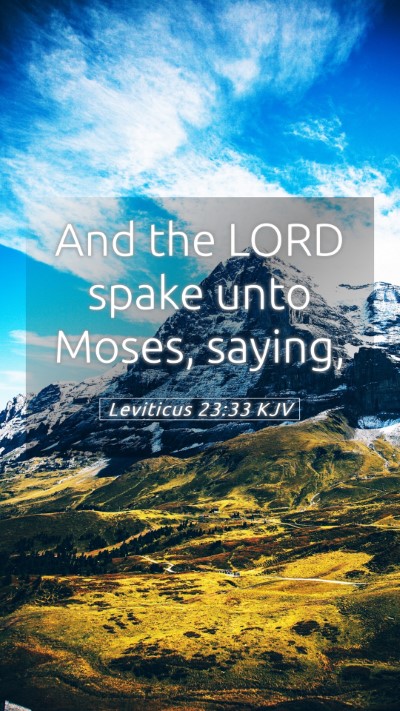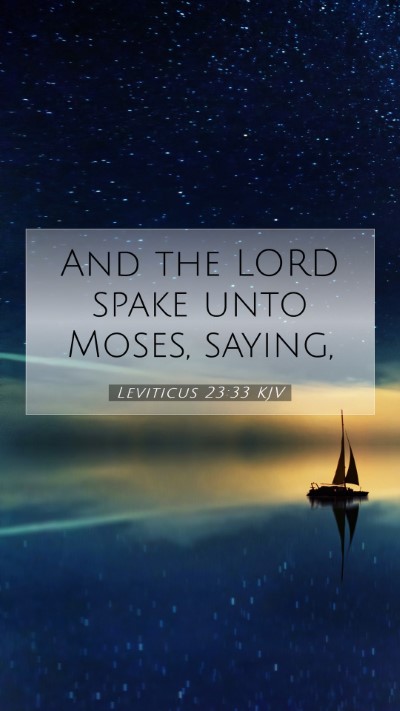Understanding Leviticus 23:33
Leviticus 23:33 states, "And the LORD spake unto Moses, saying, Speak unto the children of Israel, saying, The fifteenth day of this seventh month shall be the feast of tabernacles for seven days unto the LORD."
This verse introduces the Feast of Tabernacles, a significant Jewish festival with rich symbolism and deep spiritual meaning. To grasp the Bible verse meanings of Leviticus 23:33, we can draw insights from various public domain commentaries.
Context and Significance
The setting of this verse is crucial to its understanding. The Israelites are being instructed on the observances that reflect their relationship with God during significant times in their calendar.
Historical Context
This passage comes within the context of Israel's sacred festivals, where God commands them to remember His provision and presence. The Feast of Tabernacles (or Sukkot) occurs after the harvest and highlights themes of gratitude, God’s protection, and the journey through the wilderness.
Insights from Commentaries
Matthew Henry's Commentary
According to Matthew Henry, this festival serves as a reminder of the transient nature of life. The temporary shelters (tabernacles) symbolize Israel's wanderings and reliance on God. Henry emphasizes the importance of acknowledging God's provision and sustaining grace, which is a recurring theme in the study of Biblical exegesis.
Albert Barnes' Notes on the Whole Bible
Albert Barnes notes that the Feast of Tabernacles signifies the national joy and gratitude of the Israelites. It is not merely a ritual but an invitation to connect with the Lord and experience His presence. This understanding can enrich one’s Bible verse explanations by addressing the emotional and spiritual dimensions of the festivity.
Adam Clarke's Commentary
Adam Clarke provides detail about the observance's structure, noting that the seven days of celebration were filled with joy and unity. Clarke's emphasis on community during this time connects to the essence of Bible study groups where shared insights enhance understanding.
Thematic Elements
- Gratitude and Reflection: A key theme is expressing gratitude for God's blessings.
- Remembrance of God’s Provision: Facilitates a contemplation of God's past deliverances.
- Community and Joy: Encourages gathering and celebrating with family and community.
Application in Daily Life
For modern believers, understanding Leviticus 23:33 within the framework of applying Bible verses to daily life may involve taking time during harvest seasons or key moments of gratitude to reflect on God’s goodness, much like the Israelites did during the Feast of Tabernacles.
Other Related Scriptures
- Deuteronomy 16:13-15 - Instructions on the Feast of Tabernacles.
- John 7:2 - Jesus during the Feast of Tabernacles.
- Zechariah 14:16-19 - Future significance of the Feast of Tabernacles in prophecy.
Conclusion
In conclusion, Leviticus 23:33 offers rich insights into the nature of God's relationship with His people. By drawing from commentaries and understanding the historical context, we can gain a deeper understanding and appreciation of this Bible verse interpretation. For those engaging in online Bible study and seeking Bible study resources, this verse provides a solid foundation for exploring themes of gratitude, community, and God's provision.
As you continue to explore the significance of Bible verses such as Leviticus 23:33, let the insights from these commentaries guide you towards a more meaningful understanding of Scripture.
Further Questions
For deeper inquiry, consider these questions:
- What does Leviticus 23:33 mean in terms of the New Testament?
- How can we apply the lessons of Tabernacles in contemporary worship?
- What are the emotional and spiritual impacts of communal celebration in our lives today?


